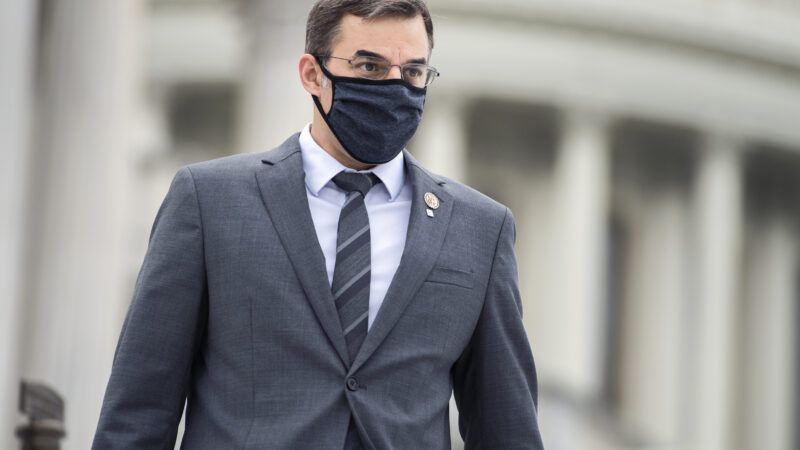Justin Amash Introduces Bill To End Civil Asset Forfeiture Nationwide
The practice is plainly unconstitutional.

Rep. Justin Amash (L–Mich.) on Thursday introduced a bill to end civil asset forfeiture, which allows the government to take property from someone without ever charging them with a crime.
Law enforcement on the local, state, and federal levels can seize assets if they were thought to be used in connection with illegal activity. That's often based solely on suspicion, though. Many people never receive their items back, even if they were acquitted or never indicted in the first place. Since 2000, state and local governments have robbed people of more than $68 billion.
Police often deposit those sums into slush funds for their departments.
What's more, the property seized doesn't necessarily have to have been used by the alleged criminal in question. Such was the case with Kevin McBride, who had his Jeep taken by police in Tucson, Arizona, after his girlfriend allegedly used it to sell $25 worth of weed to an undercover cop.
Amash's bill would eliminate the practice as we know it nationwide. "Civil asset forfeiture is a due process violation, and it always has been," said Amash in a statement. "Its history is riddled with injustices not because it's a valid practice that gets misused, but because its central premise—denying people their procedural rights—is inherently flawed. By ending it, my bill helps fulfill Congress's obligation to stop rights violations at both the state and federal level, and it ends a practice that contributes to the frayed relationship between law enforcement and the public."
It seems to be commonsense that civil asset forfeiture plainly violates our constitutional rights, particularly as laid out under the Fourth and 14th Amendments. On the federal level, Amash's bill ends the practice outright. "No person shall be required, under the laws of the United States, to forfeit to the United States any property, real or personal, pursuant to a civil forfeiture proceeding, including a nonjudicial civil forfeiture proceeding," the bill reads. Such a change would ensure, for instance, that the Drug Enforcement Administration is no longer allowed to seize money at airports, as has been their practice when travelers carry large sums. The agency stole $43,000 from a woman in Wilmington, North Carolina, and $82,373 from an elderly man in Pittsburgh, Pennsylvania, simply because they dared to fly with it. Neither was ever charged with involvement in the drug trade.
The legislation also quashes the practice at the state level by prohibiting governments from taking assets unless they secure a conviction against the alleged offender or determine via a civil proceeding that the property owner committed the offense begetting forfeiture.
The libertarian congressman, who is retiring after this session, has long been a proponent of criminal justice reform. Earlier this year, he introduced the first bill to abolish qualified immunity, the legal doctrine that makes it difficult to hold public officials accountable for violating your civil rights.
"The Constitution authorizes and obligates each branch of the Federal Government to protect individual rights," the bill reads. "The long-term failure of Congress, presidents, and the judiciary to recognize the illegitimacy of the government's civil forfeiture practices does not divest them of the authority to do so. The government cannot lawfully jettison the rights of the accused for the sake of convenience and profit."


Show Comments (173)